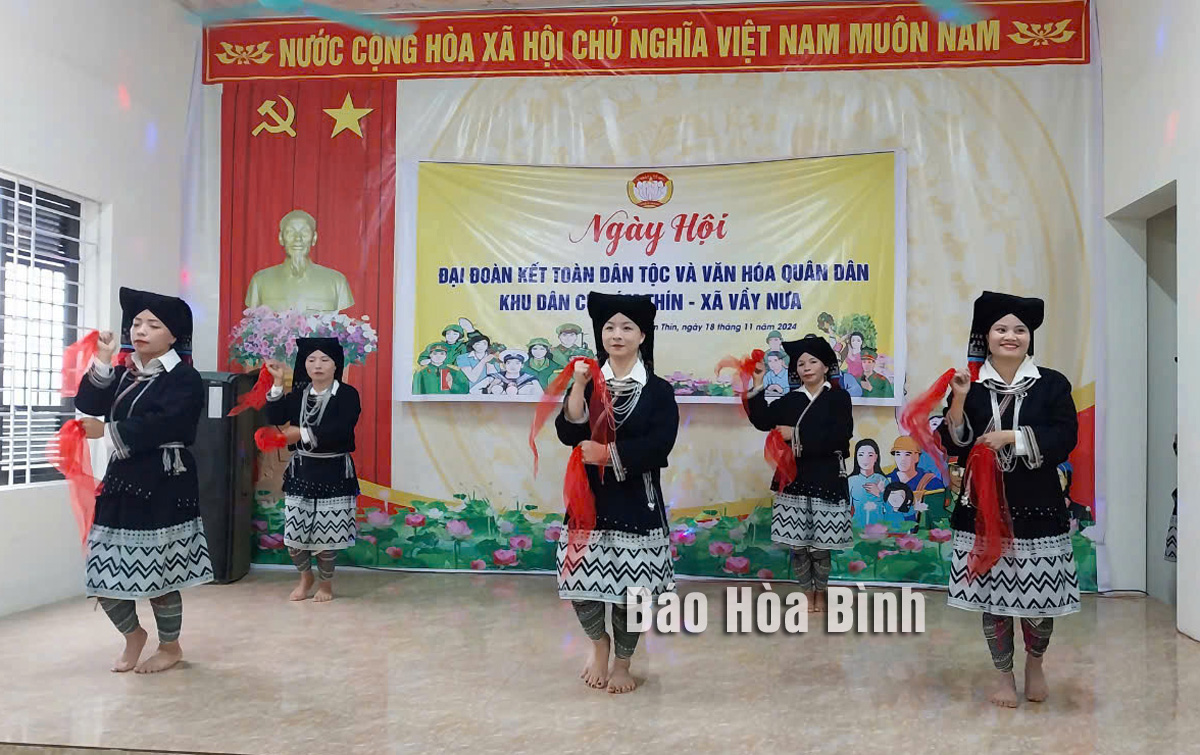
Great National Unity Day has been recently celebrated in Duong hamlet, Vay Nua commune, Da Bac district, in an atmosphere of warmth and community spirit. The event highlighted national identity and strengthened the bond of solidarity among residents.
A
performance of Tay ethnic people in Thin hamlet, Vay Nua commune, Da Bac
district at Great National Unity Day.
Located at the centre of Vay Nua commune, Duong hamlet is home to 81 households
with 325 residents. The Dao ethnic group makes up 98% of the population, while
the remainder consists of Muong and Tay people. This year, the hamlet
demonstrated strong solidarity by actively participating in movements and
campaigns, particularly the "All people stay united to build new-style rural
areas and civilised urban areas.” These efforts have bolstered community
cohesion and contributed significantly to the commune’s progress in new-style
rural development.
Throughout November, other hamlets in Vay Nua commune also held
celebrations to mark Great National Unity Day and the Military-Civilian
Cultural Day. According to Dinh Thanh Phu, Secretary of the Commune's Party
Committee, these events not only reflect community solidarity and sound
cultural values but also enrich the cultural life of the region. This unity
serves as a source of strength, enabling ethnic groups to live in harmony,
support one another, and overcome challenges in the journey toward building
new-style rural areas.
Vay Nua commune, situated along the Da River about 20km from the
district center, comprises eight hamlets predominantly inhabited by the Dao and
Muong ethnic groups. The commune faces significant challenges, including uneven
population distribution, underdeveloped infrastructure, and economic hardship.
Currently, 28.57% of households are classified as poor, while 26.2% are
near-poor.
Despite these difficulties, the solidarity among the Party organisation, local
authorities, and residents has been key to ensuring political stability, social
and security order, and economic progress. Residents trust the leadership of
the Party and actively participate in campaigns to build new-style rural areas
and foster a vibrant cultural life.
Da Bac district, where ethnic minorities make up 89.72% of the population, is
home to five ethnic groups living harmoniously while preserving their unique
cultural traditions. This diversity creates a rich and dynamic cultural and
spiritual life in the region.
As of November 20, all residential areas in Da Bac district had successfully
organised Great National Unity Day. Dinh Thi Kieu, Chairwoman of the Vietnam
Fatherland Front (VFF)’s chapter in Da Bac district, noted that these
celebrations were held safely, economically, and effectively. They honoured
traditional cultural values, recognised outstanding individuals and exemplary
families, and fostered unity between military personnel, officials, and
residents, thereby strengthening spiritual foundation in the new cultural
life.
Phong Phu commune, Tan Lac district of Hoa Binh province, is widely regarded as the cultural heartland of the Muong ethnic group. Among its many traditional communities, Luy Ai hamlet (formerly Ai hamlet) stands out as a rare location where the customs and way of life of the Muong Bi people remain largely intact.
The Truong Kha temple festival, a distinctive cultural event held every three years in Vu Ban township, Lac Son district, returned recently with vibrant rituals and folk traditions of the Muong people. Located next to the Buoi River in the Muong Trao fields, the Truong Kha Temple is dedicated to the three Kun Dol deities, revered for teaching farming techniques, irrigation, weaving, and protecting the harvest.
The demand for spaces serving community activities of residents in various areas across Hoa Binh city has been satisfied as local cultural houses now feature modern, spacious facilities thanks to the effective implementation of Resolution No. 49/NQ-HDND issued on December 28, 2021 by the city People's Council, which approved the plan for reorganising, converting, and allocating land for the construction, repair, and expansion of cultural houses in Hoa Binh’s villages and residential areas until 2025.
At the end of May, the Hoa Binh Provincial Ethnic Arts Troupe organized a series of performances for residents in Region 2 and Region 3 communes across the province. Bringing art to ethnic communities in remote, isolated, and especially disadvantaged areas has become a meaningful activity. These are not merely artistic performances but also journeys to disseminate cultural values, enrich spiritual life, and contribute to preserving the cultural identity of ethnic minorities.



